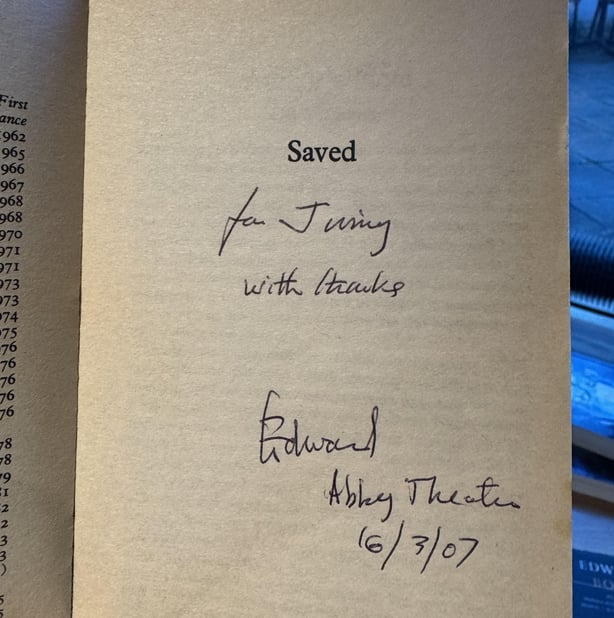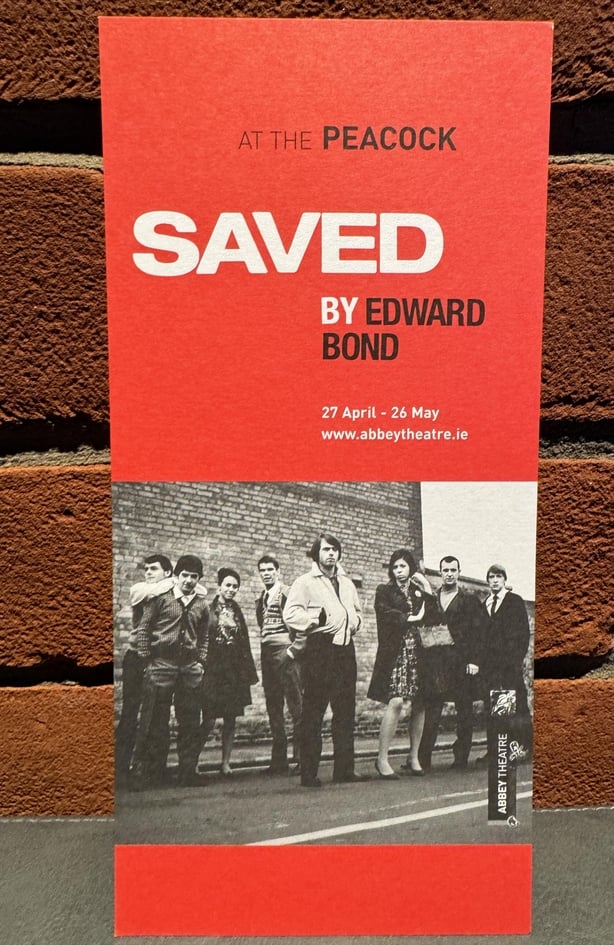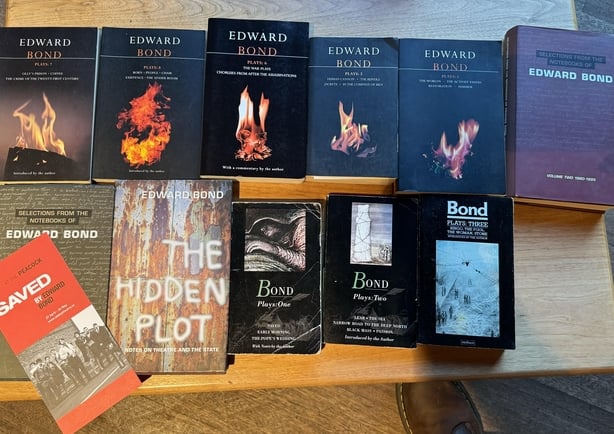Jimmy Fay, Executive Producer of the Lyric Theatre, Belfast, remembers legendary British playwright Edward Bond, who has passed away aged 89.
Renowned for such ground-breaking works as Saved, Early Morning and The Sea, Bond remained a provocative and often controversial presence in theatre for over five decades.
Edward Bond was a giant of British theatre. Even if he wasn't always loved in his home country.
He also had a powerful effect on Irish Theatre, and his rage against the powerful institutions of empire and colonialism chimed with theatre makers here.
His work was always ahead of its time - ugly, almost casual, and always shocking violence; working-class resentment; environmental catastrophes; the inability of people to reason and communicate effectively; the relics of empire that still bind and inspire a fanaticism of ye old days.
I worked with Edward Bond three times, twice by fax and once in person: on productions of Saved, Early Morning with Bedrock Theatre Company (and an epic reading of Coffee: A Tragedy one morning in Bedrock's co-founder Debbie Leeding’s apartment), then at the Abbey with Saved in the Peacock.
Fiach Mac Conghail, then Artistic Director of the Abbey, asked me to direct it. But that meant trying to persuade Bond to grant us the rights he wasn’t in the habit of giving.
I travelled to his house near Cambridge and sat at the feet of the master till he did. He was keen to see how the Irish would approach it, he said.
Holly Carey, casting director of the Abbey, and I put together an extraordinary cast headed by Tom Vaughan-Lawlor and Eileen Walsh. Tom and Eileen just blew each other’s socks off, but everyone was exceptional.

I remember Edward coming in to see what we’d done with his favourite child one bright April morning in the old Team building the Abbey used to use for rehearsals. He was grumpy and gruff at first as I walked him in, but he watched rehearsals intensely and gave me a sly smile at the end. His notes were immaculate, and he LOVED the cast, Paul O’Mahony’s design and Catherine Fay’s Costumes.
He was so terrifying, he was hilarious, and he tended to snap at stupid questions. He was a committed vegan, and I asked him since when: "Since I was in the f**king army!" We’d go for long walks around Dublin. I showed him the Henry Moore statue of Yeats in St Stephens Green - he loved Moore’s work and admired Yeats, he told me. One of the few writers he fessed up to liking. But his favourite, he told me, was Jonathan Swift, and we duly made the pilgrimage to see the old Dean’s bust in St Patrick’s Cathedral.
Edward Bond led by example. He was never going to be anything other than a torn in the side of whatever the establishment was, be that in politics or theatre.
He came to my house in Arbour Hill because he wanted to meet the youngest member of the cast, our Daniel, all four months old with bright blue eyes. Daniel had provided the crying in the long scene where Pam turns up the TV to ignore her baby crying, possibly one of the most harrowing scenes in theatre ever, maybe more so than the later infamous stoning-the-pram sequence. Edward stared intently into Daniel’s eyes, who stared back just as intently while my wife Amanda held him in her arms. "He’s truly communicating with me", said Edward very gently. This was not a man prone towards sentiment.
Edward knew Amanda’s parents were deaf, therefore he felt our baby was more expressive than normal. I don't know about that, but to witness the old curmudgeon in such a tender moment was very sweet.
I’d ask him about some of the films he wrote, Blow Up and Walkabout, both of which had a profound effect on my teenage imagination, but he dismissed them as rubbish. He was wrong about this: I recently rewatched Walkabout with my son and it still has a powerful effect and all Bond’s themes are in it, even if the achievement is more director Nicolas Roeg’s.
He told Eileen Walsh that at the edge of the kitchen table was the universe and insisted that the towel she used to dry her hair after her baby had been stoned to death was red. "Too much?" he asked. No.

My notes I have from that scene say she must continually rub her hair till she bleeds. The angst, the guilt, the terror she has, can't be washed away.
He also pointed out that the intensity loud argument they are then having, Len and Pam, was on the sofa they conceived on.
He asked me to take all the music I had put into Saved out, which I did. But when I put most of it back in, he just grinned. He wasn't crazy about directors' slickness, but he admired being engaged with.

Bond was not afraid of our human propensity to pillage and destroy one another, and he refused to soothe with illusions of another belief system that could lead the way - but he did offer hope. There’s an extended scene at the end of Saved where Len fixes a chair, and nothing is said except "Fetch me 'ammer", which is ignored, but it offers a glimmer of hope that at the end of such a bleak play where a baby is dead, relationships are in tatters, yet someone is still fixing something to make it better.
Bond was prone to aphorisms and said he learnt a lot by improvising in his early Royal Court days.
"Theatre has only one subject: Justice."
Edward Bond led by example. He was never going to be anything other than a torn in the side of whatever the establishment was, be that in politics or theatre. No honours, no titles, no real wealth was going to come his way but what he’s left us is a body of work that is unique, uncompromising, theatrically daring and ferociously independent.

